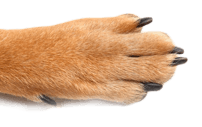
Everyone tells us we should train our dog – but what is the point? Why is training important and what are the benefits for both our dogs and for us? And what happens if we don’t?
Why Training is Essential for a Happy Dog and Home
We expect a lot from our modern companion dogs – often without realising how difficult fitting into our lives can be for them. Our dogs live as part of our families, sharing our homes, our hearts and often our sofas. We expect them to be able to come with us wherever we go, be social, be well-behaved – and along with that, we have to be able to keep them safe and keep others safe from them.
All of this needs training. Both training the life skills a companion needs to live with us as a family member – which includes toilet training, sleep training, getting used to all the sounds and sights of a home, being groomed, and living harmoniously with all family members (human, canine, feline etc!).
Then they need to be able to do the things that mean we can exercise them safely – such as walk on a loose lead and come back when they are called, be able to wait when we need them to (before jumping out of a car or charging through a door), and to be friendly towards, or at least able to ignore, other dogs and people.
What Happens If You Never Train Your Dog?
Without training these basics, your dog will not fit into your life and family without conflict, it will be difficult to keep them healthy and happy, and you will not be able to keep them safe while you give them the exercise and enrichment you need. Many dogs who find themselves being rehomed or in rescue centres are there as a result of not being trained and given the help they need to be a companion dog.
Puppy Training: Why Starting Early Matters Most
Life skills training starts almost as soon as your puppy becomes sentient (at about 19 days old). A puppy that is born and reared in the home will develop hearing and seeing all the sights and sounds of a home – and will learn the rhythms of family life with regard to waking time and sleeping time.
They will get used to seeing people and being handled by them – and a good breeder will handle all these early interactions appropriately, helping their puppies start off confident and social.
The puppy’s mother will start toilet training her babies by moving them away from the sleeping area to pee and poo, and her and the other littermates will start to teach bite inhibition and that if you want to play, you should be gentle with your teeth.
When we bring a puppy home – usually around 8 weeks of age – we need to continue this life skills training from day one while helping our new arrival settle into their new life.
For most people, their first focus is toilet training and sleep training – which go hand in hand but there is no reason why basic exercises such as learning their name or watch me, sit, and the beginnings of recall can’t be started as soon as the puppy starts to feel at home.
The most important thing to remember is that ‘training’ happens every moment of every day – not just in the time you set aside to focus on certain exercises. Your puppy is learning from every experience they have and every interaction they have with you and with others. What they learn in these early days and weeks, will form the basis of your relationship and how successful your training is in the future.
Enrichment and Problem Solving for Puppy Development
It is important to include enrichment and problem-solving exercises in your puppy training. This can be anything from simple things like putting some dog treats in a cardboard tube and letting your puppy work out how to get them out, to more advanced puzzles that require more nose work, dexterity or brain power. All of these things help your puppy’s physical and mental development, build their confidence and help them deal with frustration – as well as being enriching and fun for you both.
The Benefit of Puppy Training Classes
Almost every training exercise can be taught without ever leaving home – but what that doesn’t do is teach your puppy to be able to do them in real life situation with real life distractions.
Finding a good reward-based training class will give you help and support with your training, but most importantly, it will give you and your puppy the chance to practise being around other people and other dogs in a controlled environment – and teach your puppy to be able to listen to you when there are things going on around them. Exactly what you are going to need when you are out and about.
A good puppy class will also give your puppy (and you) social opportunities and the chance for well-managed play sessions. Learning how to interact with other dogs who are not their mother or littermates is an important part of training – and learning to be a dog!
Building a Relationship
Reward-based training – along with play – is probably the best thing you can do to build a relationship with your dog. Every single thing you teach them deepens the connection and the bond between you as you learn to work together and trust each other.
Training also helps you have the confidence to know that your dog will be well-behaved and that you can keep them safe, and that you can cope with your dog’s behaviour in any situation – or at least know how they are likely to respond.
Working together with your dog and having the achievement of mastering new skills is fun and enjoyable for you both.
Exercise
All dogs need exercise – and some of them need a lot of it! Without this, they can become bored, frustrated and develop all kinds of behaviour problems from destructiveness to aggression
Daily dog walks should be the highlight of a dog’s day - and they should be fun and enjoyable for both dog and human. Walking an untrained dog, especially if they are big and strong, is a nightmare for owners, and many dogs do not get the exercise they need because they are difficult to walk. Other owners just dread walking their dog.
Training your dog to walk on a loose lead and to come back when you call them, will mean you can give them all the physical exercise they need while keeping them safe – and keeping others safe from your dog. With more dogs in the UK than ever before, along with stringent dangerous dogs’ legislation, this is getting even more important.
Training Your Dog for Social Responsibility
When we are out and about, it is important that our dog is not a nuisance to others – human or canine - or even worse, frighten or worry others. This is one of our main responsibilities as a dog owner – both to everyone around us and to our dogs. It is only by training that we can do that.
Ongoing Training for Your Dog’s Mental Wellbeing
Most of our breeds or dogs were originally bred to work – and to use their brains. To stay happy and healthy, they need the chance to use their brains as much as they do their bodies, and by incorporating regular training sessions into our dogs’ day to day routines (whether in the house or as part of walks) we can give them this outlet and makes their lives more fulfilling.
Even after you have trained exercises, you should still do regular brush-up sessions and continue to train new things throughout your dogs’ life. While people might say that “you can’t teach on old dog new tricks”, this isn’t true. A dog who has had a life-long history of learning and of working with their owner, will happily be able to turn their paw to new skills. This in turn may also help stave off cognitive decline in old age.
Training your dog is the best way to ensure they fit into your life, your home and your family. It is also the best way to ensure they stay happy and healthy, have the freedom to enjoy exercise and life to the full, and ensure both their safety and the safety of all those they meet.
Better still, it is fun and will improve your relationship for life.





